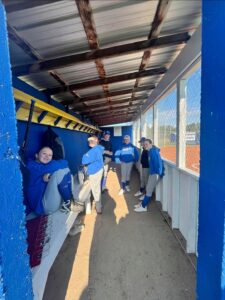During a recent Woodlands County Council meeting, representatives from AltaLink provided
information on a newer program meant to mitigate the risk of wildfires impacting the power
supply in the province. Collin Harvey, AltaLink’
s RPF Municipal and Community Relations
Manager, was at the meeting. AltaLink is Alberta’s largest transmission facility operator,
servicing roughly 85 percent of Albertans. They have over 13,000 km of transmission lines and
over 300 substations.
AltaLink provides infrastructure that allows power generators using gas, hydro, solar or wind to
send their power along the transmission lines, which moves into AltaLink substations before
being handled by distribution companies like Fortis, who distribute it to retailers who then sell it
to consumers.
The infrastructure owned by AltaLink enables many Albertans to access power. Growing
concerns over wildfire events have pushed forward proactive practices to help mitigate the risks
posed by powerlines starting fires and fires destroying infrastructure such as wooden power
poles, something seen during the fire activity last year.
Harvey explained that in 2019, AltaLink created a Wildfire Mitigation Plan. “Wildfires have
become a significant feature on the landscape over the last few years. It was sad to see what
happened in Jasper, and last year was obviously a very bad fire year across the province,” said
Harvey. “With the number of fires lit, about 85 were caused by power lines. None of those power
line-caused fires ended up being significant, but a lot of the significant fires did have a
significant impact on our transmission infrastructure,” he said.
“When we get into those situations, the line stays de-energized until we can get it back up and
running,” said Harvey. “AltaLink has been taking wildfire mitigation seriously. We are a leader in
Canada in that realm. We can’t get our risk right down to zero, but we can do what we can to
reduce the risk to the greatest extent possible.” Harvey explained that the tricky part was finding
a balance between protecting customers and communities by having resilient power lines that
can handle events while at the same time, not putting undue cost onto ratepayers.
Some of the key aspects of the plan include fire threat maps. “We’ve used third-party fire
experts who have mapped out our transmission lines and looked for areas where in the event a
fire did ignite along one of our lines, those areas may have a higher impact than in other areas,”
he explained.
Another step is Facility Wildfire Risk Reduction Programs. Harvey explained that they are
upgrading their wood pole structures in high-risk areas. “We are trying to fire-harden our
equipment as we move forward. That includes replacing the insulators, those cone-shaped
strings that hang the wire up to the structure. We’re replacing those to make sure they are in the
best condition possible. We are also replacing wood cross arms on those lines with steel cross
arms. If we get (power) leakage up there, sometimes that wood cross arm can be a source of
ignition. Steel reduces that risk.”
Enhanced Situational Awareness Monitoring is also in the program and includes adding more
cameras and weather stations to their network. “We are using a third party that provides a daily
report on fire weather in our service territory and geographical areas. It helps show us the trend
of how the weather is progressing and if we are getting into extremely hot, dry factors and how
that will change our operating behaviours.” Harvey said in the last quarter, they added
seventeen new weather stations.
Similar to FireSmart, Harvey said AltaLink had also increased vegetation management
activities. “We are making sure that vegetation is maintained, and we’ve also increased the
number of times we do inspections. When we start getting into more extreme risk days where
the fire weather looks concerning, we have enhanced operational practices,” he explained.
One of those practices is to no longer re-energize a line that suffered a fault if the area has risky
weather, like hot and dry conditions. “Typically, when a fault happens on the line, auto-reclosers
will attempt to energize the line immediately so that we don’t have a disruption in power.” He
explained that instead, they would send a crew to inspect it.
Should a fire come close to a community, like Woodlands County or the Town of Whitecourt,
Harvey said they have a final resort option called a Public Safety Power Shutoff. “If the
conditions are concerning, we (could) proactively shut off the power to some of our transmission
lines in those areas until conditions clear,” eliminating the risk of a powerline igniting a fire in a
very dry area.
Harvey said turning off the power to an area and leaving residents in the dark isn’t something
they take lightly. “We are a power company. We take a lot of pride in providing service, so it’s
not something we want to do, but if it’s a matter of public safety versus providing that service,
public safety is number one, so we will do that.” Multiple factors could lead to a power shutoff,
including high winds, low humidity, dry vegetation, close fire activity and real-time observation
from boots on the ground.
Harvey said the proactive approach would remove power from an already risky scenario. “We
don’t want to further advance a fire.” He said once off, it wouldn’t be as simple as flicking back
on the switch. “It will take some time for us to get that line energized again. With us having the
line off, we won’t know what condition the line is in because we won’t have any data to tell us
about any faults or trips that have happened. We would have to access the line.”
Woodlands County will be looking to see if there is an opportunity for synergies within AltaLink’s
Wildfire Mitigation Plan, including within its extensive camera network. For more information on
what a Public Safety Power Shutoff could entail for residents and how to be prepared, visit
www.altalink.ca/wildfiresafety.








More Stories
Community spirit shines at large-scale youth baseball event
Birthday party chaos sung beautifully by Pumpjack Players’ youth in spring musical
Gearing up for another season of cars, cruising and camaraderie